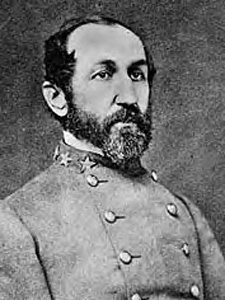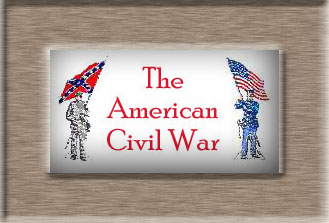

 Josiah Gorgas Josiah Gorgas
|

PATRIOTISM and PROFIT By every statistical measure the North had a tremendous initial advantage in materiel and the ability to produce it. The South was not nearly as lacking in industry as is generally assumed, but it wanted key components of a war-making state. In the crucial area of armaments, when the war began, the South had no musket caps, no improved arms, no sabers or carbines, no powder, no powder mills, no cap machines, and no improved cannons. A single county in Connecticut in 1860 manufactured firearms worth ten times more than what was produced in all the Southern states. What's amazing is how each side managed its position in the initial lopsided balance of materiel. The successful resistance of the South for four years is proof of what can be accomplished with leadership, enterprise and hard work by a people totally unprepared for war. Flexible minds explored every possibility to its utmost limits. As Americans all, we ought to take pride in that. The phrase "Yankee ingenuity" seems to be about 600 miles off the mark. Soon after the war began, the Richmond arsenal was turning out 300,000 percussion caps per day, caps which had been tested and found superior to English-manufactured ones. A Virginia mechanic had even found a way to recycle the scrap metal left from the cap manufacture. For all the difficulties of starting a munitions industry from scratch, under fire, with only untrained apprentices and patriotic gusto, the South can take justifiable pride in the fact that no battle was lost by the Confederate armies for want of ammunition. (I can't refrain from noting, with a touch of state pride, that the genius of CSA armaments was Josiah Gorgas, a native of south-central Pennsylvania. His wife was from Alabama, and seems to have persuaded him of the wonders of Southern culture, so he went with the CSA when the shooting started. Never underestimate the role of Southern women.) Wool for cavalry blankets was scarce (almost all of it was raised in the North), and so the South found a way to weave blankets from spanish moss -- coarse, but durable and waterproof -- for only $2 apiece, one-twentieth the cost of a wool blanket in some parts of the South in 1863. When Northern troops overran the copper mines in Tennessee, the South opened new mines in North Carolina and elsewhere and even dismantled turpentine and apple brandy stills for the copper tubing. When there wasn't enough copper left to make Napoleon guns, the CSA started making a light, cast iron-banded, 12-pounder gun that shot farther and lasted longer. Contrast all this to the way the North squandered its advantages in a mad rush for profits first, victory last. Here's the short list, courtesy of historian Howard Zinn: "... defective guns sold to the army by contractors, sand sold as sugar, rye sold as coffee, shop sweepings made into clothing and blankets, paper-soled shoes produced for soldiers at the front, navy ships made of rotting timbers, soldiers' uniforms that fell apart in the rain." The U.S. government issued coffee in whole beans to prevent dealers from adulterating it. Soldiers ground it by pounding it on rocks with their rifle butts. Joe Hooker's reform of the food supply system after he took charge of the Army of the Potomac uncovered hair-raising corruption. Warehouses stood full of fresh food a few miles from the front, where men were eating old rancid meat. The good food never got to the soldiers because it was being sold off by commissary officers, in some cases to Virginia rebels. The war was run for the convenience of the New England merchants. Look at the totality of the North's enlistment policies, which were driven by wealthy, well-organized Massachusetts, which could afford to play the quota-and-bounty game that other states could not. Jay Cooke made $3 million a year during the war in commissions alone for selling government bonds. J.P. Morgan bought 5,000 rifles for $3.50 each from an army arsenal, and sold them to a general in the field for $22 each. They were defective and would shoot the thumb off a soldier who tried to use one. A Congressional committee noted this in the fine print of an obscure report, but a federal judge upheld the deal as fulfillment of a valid legal contract. Cooke was too old to worry about being drafted. Morgan was among those who paid $300 for a substitute to fight in his place. So was John D. Rockefeller, Andrew Carnegie, Philip Armour, Jay Gould and James Mellon, whose father wrote to him that "a man may be a patriot without risking his own life or sacrificing his health. There are plenty of lives less valuable." It wasn't just a handful of robber barons. Northerners all down the line milked their government. A special congressional committee uncovered a case of the War Department paying $117 for horses when the market price was $60, and lots of 250 where all but 27 animals were diseased, maimed, or otherwise unfit. Lancaster County, Pa., men chuckled at the fortunes they made selling the same mount to Uncle Same two and three times. For the spirit of Northern business in the face of a war crisis, I can think of no better example than one from the major incursion of Southern armies onto Northern soil, the Gettysburg campaign. In June, 1863, with the rebel troops fanning out over southern Pennsylvania, thousands of farmers from Franklin, Cumberland, Adams, and York counties fled east with their horses and livestock and families, trying to put the Susquehanna River between them and the invaders. They all got caught in a huge jam-up on the western end of the 5,620-foot-long Wrightsville bridge (the main eastward route), because the bridge company insisted on taking the toll from everyone who wanted to cross. A U.S. infantry major finally contacted the president of the company and persuaded him that, "the removal by our people being involuntary, ... tolls should not be exacted." Col. Charles Wainwright, meanwhile, wrote in his journal two days after the end of the Gettysburg battle that the town's men had returned, "great strong able fellows most of them, but not one had courage enough to take a musket in hand for defense of his own home." The heroic myth of John Burns, the old man who came out with his musket to fight alongside the Northern troops on July 1, depended on the fact that he was the only Gettysburg citizen to do so. The invading Confederates came back astonished at the number of healthy men they saw lounging around the town or tending the fields. "It gave us a realizing sense of the strength of the enemy," one wrote, "to see that they could have so large armies in the field and leave so many lusty men in peace at home." The invasion was felt by the North as a test of its commitment. It was the first major incursion into a "free" state and the first trial of the citizens of such a state under the conditions that had beset parts of the South for two years. Could the Northerners subordinate self-interest to a great collective effort, or were they vitiated by greed and love of comfort, the very moral weaknesses they claimed had been bred in the Southern whites by their slave-ownership? "Unfortunately, in this unparalleled emergency, reports from the front indicated that the virtue of civilians had been tested and found wanting. ... Northerners grown fat from abundance had cracked under the iron hammer of war," according to the most recent historian to tackle the subject. Pennsylvanians' unhappiness over conscription is one reason for the tepid response to Pa. Gov. Andrew Curtin's call to rise up and defend homes and firesides.[1] The people of the North, on their own, were capable of great exertion and organizational effort. Sometimes I question the efficacy of what they did, though. The Christian Commission, for instance, was an astonishing grass-roots force that built sanitary systems and kitchens in the army hospitals and sent out 95,000 packages of food, clothing, and medical supplies.
But ultimately it seemed interested in assuring that the soldiers could die a Christian death: to an army of two million men it distributed 1.5 million Bibles, a million hymn book, and eight million tracts.
|
| �2002Douglas Harper | "When misunderstanding serves others as an advantage, one is helpless to make oneself understood." -Lionel Trilling |